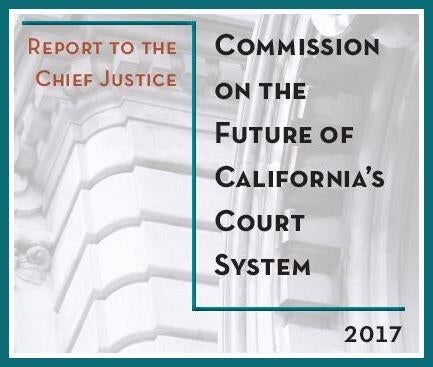Taking Minor Traffic Tickets out of Criminal Court
Millions of tickets are handed out each year for minor traffic infractions, and treating traffic offenses in the criminal arena can mean major fees, suspended driver’s licenses and even arrest if a driver fails to appear in court.
A new proposal from Chief Justice Tani G. Cantil-Sakauye, based on the work of her Commission on the Future of California's Court System, seeks to do away with these oversized consequences by making minor traffic offenses–such as failing to signal before changing lanes–civil violations.

Ventura County Judge Mark S. Borrell, an advisory member on the Futures Commission’s Criminal/Traffic Working Group, answered questions about the proposal:
Q: What prompted the commission to address this issue?
A: The impetus behind the recommendation to treat minor traffic violations as civil violations–rather than criminal offenses–was threefold: improve access to justice by developing user-friendly court processes, such as online trials via videoconference; increase court efficiency; and create a system that doesn't disproportionately punish defendants.
The adjudication of minor traffic violations represents a major part of what criminal courts do and impacts a large and diverse group of Californians. These are violations such as running a stop sign or using a cell phone while driving. About 4 million tickets for these types of minor traffic violations are written each year, which represents about 75 percent of the criminal caseload of the courts.
Q: What are the negative consequences of treating traffic offenses as criminal charges?
A: One of the most significant consequences is the way we treat individuals who do not come to court when they are supposed to. In a criminal case, the defendant must come to court. Can you imagine someone charged with a more serious traffic offense, like a DUI, not coming to court? The judge would issue a warrant to have the person arrested and brought to court, and the person would have some explaining to do.
Because we treat minor traffic violations as criminal offenses, the mindset is the same: you have to come to court, or otherwise deal with your ticket by your court date. And if you don’t, there will be a serious consequence. Indeed, that ticket that gets signed at the roadside is a promise to do just that–to come to court. The law provides a number of ways a court can deal with someone who does not keep that promise. Courts can issue an arrest warrant, add a penalty of up to $300 onto the person’s case, or suspend the person’s driving privilege until they come to court.
Q: How would the commission’s proposal change the current process?
A: The burdens of the current process fall particularly hard on individuals with limited resources. In some cases, the fine for not coming to court on time could be more than the ticket itself. And the loss of a person’s drivers’ license can have significant repercussions on work, family and educational opportunities.
Viewing these minor violations as civil matters gives us a different mindset and fairer process. In civil cases, if defendants don't come to court, we don’t punish them. We just treat the case as unopposed and resolve the matter in the person’s absence. Treating minor traffic violations in this way disposes of the need for arrest warrants, additional fines and driver's license suspensions. And, just as in other civil cases, if a person misses court for a good reason, there will be a simple process to ask the court for a second chance.
This is an example of the type of flexibility that a civil case model provides. But I want to emphasize that by moving minor traffic violations into civil courts, we don’t change the rules of the road—what is a violation now will remain a violation. Nor will it affect law enforcement’s ability to do their job. None of this will change the way that serious traffic offenses are handled, like driving under the influence.
Q: Do other states treat traffic infractions as a civil matter?
A: Yes, there are several. In the process of developing this concept, we focused our attention on four: Michigan, Minnesota, Rhode Island and Washington. We carefully looked at their procedures and had extensive discussions with judges from each state to identify the things they felt were the strengths and weaknesses of those procedures. This gave us the opportunity to construct a strong model for California.
This is also not a new concept in California. Over thirty years ago, a version of this concept was tried here as a pilot project. The difference is the earlier program relied on administrative hearing officers to resolve traffic tickets, and it was discontinued in 1985 amid concerns about the cost of creating and operating a new bureaucracy. We have used that experience to help us shape the current proposal.
Q: There is a much lower bar to prove a charge in civil court. How would this affect traffic cases?
A: The rules in civil cases are not the same as those required in criminal cases. By treating traffic tickets as civil matters, we can take advantage of that flexibility to create procedures which are more user-friendly and more efficient for the court.
One example of that is the way trials would be conducted. Criminal rules of evidence are complicated; lawyers spend a lot of time in law school learning them. And we felt it did not make any sense to apply those rules to traffic ticket trials, because very few people charged with a minor traffic violation have attorneys. So the idea was to use the flexibility of civil procedures to develop a set of rules of evidence that are intuitive and easy for most people to apply. But the recommendation retains the requirement that the ticketing officer come to court to prove the violation.
The proposal also removes the classic criminal law burden of “proof beyond a reasonable doubt.” Instead, it adopts the burden of proof used in civil cases which is a “preponderance of the evidence.” Thus, a violation would be established if the evidence presented showed it was more likely than not to have occurred.
Q: The state Legislature has offered amnesty programs for overdue traffic fines. Why do we need to go further?
A: The amnesty programs were temporary solutions with a narrow focus. This proposal envisions a long-term change to how we, as a state and a judicial branch, view minor traffic violations. That change in perspective opens up a number of opportunities to develop procedures that will make it easier for Californians to resolve traffic tickets for minor violations and increased court efficiency.
Q: Many Californians don’t have the means or flexibility to appear in court to challenge traffic tickets. Would violators still need to show up in person?
A: This proposal will help the court leverage the power of various online resources. It is our vision that a person with a ticket for a minor traffic violation could track and resolve that ticket entirely online. This would include the option to elect to have a trial based solely on online submissions from the defendant and the officer, or perhaps even online video conferencing. This would be a tremendous resource for people who–because of work, family or transportation issues–can’t come to court. Part of the proposal would be to explore these resources and develop online self-help tools.
Q: What input have you gotten since you released the proposal for public comment?
A: The feedback has been overwhelmingly favorable. There has been constructive criticism and questions about how all this would work in practice. Those comments and suggestions will be studied as the process moves forward.
Q: What are the next steps?
A: The next step is to continue to refine the proposal. Obviously, a change this significant is not something the judicial branch can do on its own. This will require legislation. We, as a branch, are looking forward to working with legislators and the Governor to develop legislation that will best serve California.
Judge Mark S. Borrell is a Ventura County Superior Court judge and former chair of the Judicial Council Traffic Advisory Committee.


